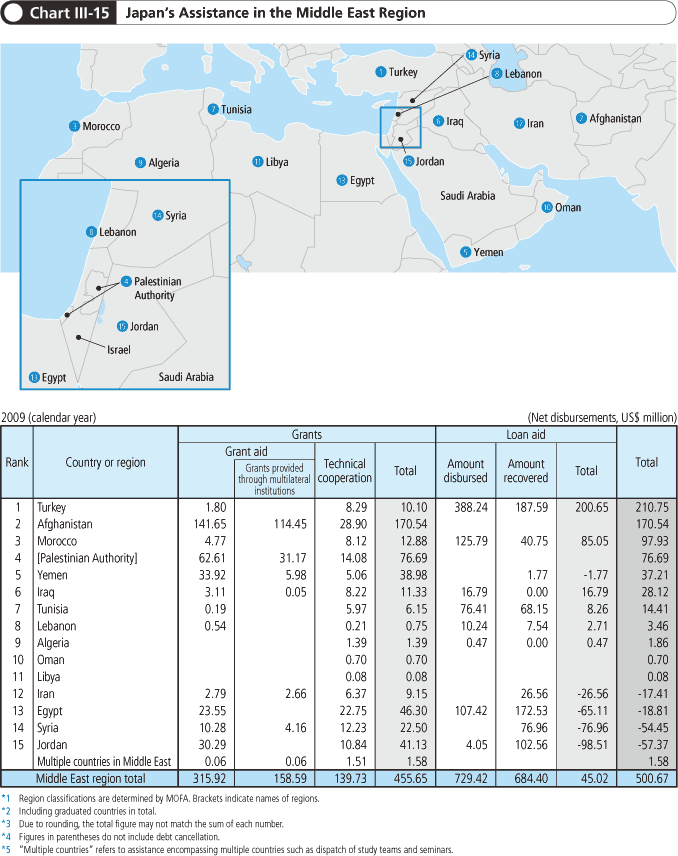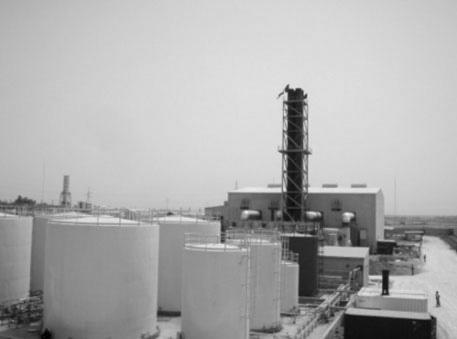Japan's Official Development Assistance White Paper 2010
5. Middle East
The Middle East is a major energy supplying region which accounts for about 60% of the world’s oil deposits and about 40% of its natural gas deposits. It also occupies a strategic position for transport, such as major maritime shipping routes which connect Asia and Europe. For these reasons, the stability of the Middle East is extremely important for the global economy. Japan is dependent on this region for approximately 90% of its oil resources, and major sea trading routes linking Japan with Europe pass through the region as well. As such, it is an exceptionally critical region for Japan’s economic and energy security as well.
<Japan’s Efforts>
In the Middle East there are countries and regions with difficult security situations where living and social infrastructure has been destroyed due to the fact that peace within the region has largely gone unrealized. These include the Palestine issue, as well as Iraq, Afghanistan, and others. Such conditions not only impoverish the economies and societies within these countries and regions, but threaten the stability of the Middle East as a whole. Moreover, these are also problems which could potentially impact the peace and stability of the international community as a whole. The international community’s concerted assistance is of the utmost importance when it comes to achieving sustainable peace and stability in these countries and regions, as well as their nation building and national reconstruction. The realization of peace and stability in Afghanistan and Iraq and the achievement of Middle East peace is an issue that is incumbent upon the peace and stability of the international community as a whole. In addition, Japan also recognizes that they carry enormous significance in terms of the realization of ”human security” and ”peacebuilding,” which are a basic principle and priority issue, respectively, of Japan’s ODA Charter. As such, Japan deploys proactive assistance by collaborating with the international community.
As the Middle East includes high-income oil-producing countries as well as LDCs, the economic situation of each country is diverse. What is more, the soaring oil prices that have been seen in recent years have a tendency to usher in economic imbalances within the region. As an example, while oil-producing countries receive the benefits of these price hikes, they lead to steep jumps in prices — including the price of fuel — in non-oil-producing countries. In order to alleviate this, economic and social infrastructure development and poverty policies are indispensable in low and medium-income countries.
However, to date even the oil-producing countries at a relatively high-income level have had monoculture economies that are dependent on oil. Because of this, they have not adequately nurtured industries to absorb the increasing labor population. There are concerns that future rises in the unemployment rate will serve as a potential destabilizing factor, and human resource development also poses an important challenge. In addition, since most of the Middle East region belongs to a desert climate region, it is vulnerable to the global-level challenge of climate change. The issue of water resource in particular is a crucial challenge that will impact the stability of the region.
Japan cooperates on the construction of stable economic foundations by weaning oil-producing countries away from their oil dependent economies. It does this by promoting the diversification of industry while having them continue with favorable economic development. On the other hand, Japan works to reduce poverty in low and middle-income countries that lack oil and other natural resources, and has resolved to provide support in a continuous manner for their sustainable economic growth. What is more, the management of valuable water resources is an important challenge shared by the countries of the Middle East region which could potentially impact regional stability. On the whole, Japan focuses on the following points with the aim of strategically narrowing the focus down to support sectors and targets in each country. As such, it proactively provides support for creating an environment for the economic and social stability of the Middle East region and for achieving Middle East peace.
(1) Peacebuilding support (Iraq, Afghanistan, Palestine)
(2) Cooperation to support the Middle East peace process (assistance for Palestine, assistance for the surrounding Arab countries)
(3) Democratization support
(4) Support for economic and social infrastructure development and poverty countermeasures in low and middle income countries
(5) Support for measures to combat terrorism and for security
(6) Support for water resource management
(7) Support for human resource development that is consistent with the needs of each country and region
Japan has proactively worked to provide support for Iraq, such as through ODA of up to US$5 billion and approximately US$6.7 billion worth of debt relief. For Afghanistan, Japan announced its new strategy for dealing with the threat of terrorism in November 2009. Japan announced that it would provide support on a scale of up to a maximum of about US$5 billion for roughly five years starting from 2009 in accordance with the future situation in Afghanistan. Through this, the total value of the announced contributions came to US$6.5 billion.
●For Japan’s support for Afghanistan, Iraq, and Palestine, see Section III, Chapter 2, Section 2, 4. Peacebuilding.

● Iraq: Project for Construction of Diesel Power Station in Samawah
As of the beginning of 2004 there were no power stations within the Al-Muthanna Governorate in southern Iraq, and the governorate was dependent on transmissions of electricity from other governates for its supply of electricity. Compared to the demand for electricity within the governate of roughly 200MW, the supply was only around 40 to 50MW. Because of this, chronic power outages lasting for long periods of time occurred in the governate, which posed a major hindrance to civic life. Therefore, Japan responded to a request from the Iraqi Ministry of Electricity to provide grant aid totaling approximately ¥12.7 billion. A 60MW (four 15MW plants) diesel power station that uses the heavy oil refined at a nearby oil refinery as its fuel, was constructed in the city of Samawah. This power station began supplying power in January 2009, which more than doubled the electricity that had previously been supplied within the governorate, augmenting this to half of the electricity supplied within the governate as a whole. As such, the project has contributed to assistance for the reconstruction of Samawah.

The diesel power station that was constructed

